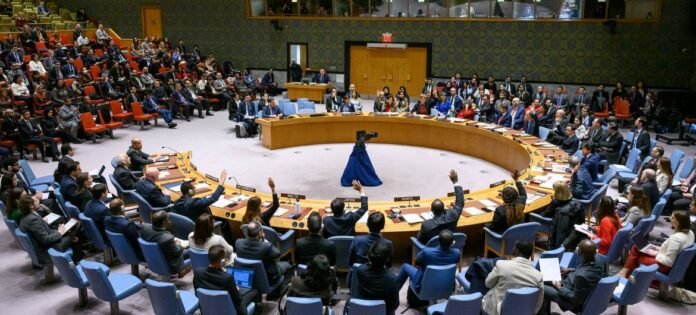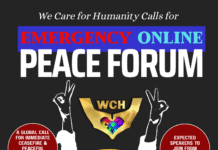The protection of civilians in conflict zones, where violations are rampant, remains a top priority for the Human Rights Council, its President told the General Assembly today. Member States described the humanitarian situation in Gaza as a “disgrace” to the international human rights order.
“Despite the challenging international atmosphere and limited financial resources, the Council has advanced its efforts to promote and protect human rights,” President Omar Zniber assured the 193-member Assembly, presenting the Council’s annual report (documents A/79/53 and A/79/53/Add.1).
All countries must protect civilian populations and uphold international human rights obligations, “whether in the Middle East, Europe, or Africa”. He emphasized the significant role that small island developing States and least developed countries play in the Council’s work, particularly in areas such as development, climate change, and overcoming vulnerabilities.
This year, the Council continued its efforts by making recommendations to the General Assembly on human rights situations in Myanmar, Syria, and the Occupied Palestinian Territory, including East Jerusalem. The Council adopted a total of 139 texts covering a wide range of human rights issues and expanded its focus to include discrimination against intersex persons, domestic violence, and the social reintegration of former prisoners.
To further strengthen the Council’s impact, United Nations technical cooperation and capacity-building must be prioritized, as effective communication is key to clarifying situations and addressing important questions, he emphasized.
Global Respect for Human Rights Deteriorating
General Assembly Vice-President Francisco José Da Cruz (Angola), speaking on behalf of Assembly President Philémon Yang (Cameroon), stated that global respect for human rights is deteriorating due to interconnected crises such as climate change, displacement, famine, poverty, and ongoing conflicts.
“Nowhere is this more evident than in the Middle East, where the scale of destruction has led to intolerable suffering in Gaza, a rising death toll in Lebanon, and renewed risks of widespread conflict throughout the region,” he said. Conflicts must end as they erode humanity and dignity, undermining aspirations for a better future.
“We must always be guided by the noble principles enshrined in the Universal Declaration on Human Rights, which clearly states that all human beings are born free and equal in dignity and rights,” he added. Despite numerous challenges, the Human Rights Council has continued to address both recurrent and emerging human rights issues.
Urgent Attention to Humanitarian Crisis in Gaza
Speakers in the ensuing discussion called for urgent attention to Israel’s ongoing conflict in Gaza and adherence to relevant international protocols.
The current situation in Gaza “is a disgrace to the human rights system and the United Nations as a whole”, said Venezuela’s representative, speaking for the Group of Friends in Defense of the Charter of the United Nations. He categorically rejected double standards in human rights, criticizing mechanisms that purported to make impartial assessments without the consent or participation of the States involved.
“The brutal attacks on the Gaza Strip and the West Bank are grave violations of international humanitarian law and human rights law, visible to the world without accountability,” Egypt’s representative stated. Israel violates Palestinians’ rights to food, water, education, health, and civic and political participation.
Syria’s representative echoed concerns about double standards and selectivity in human rights, emphasizing that such issues should not be politicized. Some countries exploit the United Nations and its bodies, including the Human Rights Council, to launch defamatory campaigns and exert political pressure for selfish interests.
Qatar’s representative pledged continued efforts to support the Council’s growth and condemned the grave violations of human rights and international law in Gaza, as well as attempts to forcibly displace Palestinians.
Against the backdrop of a global backlash against human rights and democratic norms, the Universal Declaration of Human Rights is more relevant than ever, asserted Iceland’s representative, also speaking for Denmark, Finland, Norway, and Sweden. She called for support of a vibrant civic space and protection of human rights defenders, urging dialogue even amid disagreements.
Equitable and Non-Politicized Allocation of Resources
Delegates warned against “instrumentalizing human rights for political purposes”. Belarus’s representative noted that country-specific topics risk undermining the Council’s credibility. Integrating human rights into all UN activities could be seen as an ideological move, he said, rejecting the Council’s report as biased and unacceptable.
Pakistan’s representative emphasized the need for equitable resource allocation across the “spectrum of rights” and called for enhanced funding and technical support for capacity-building programs. She highlighted the rise of racial hatred, religious extremism, and violent nationalism, urging investigation and recommendations to counter these threats.
Enhancing Coordination with the Third Committee
Delegates underscored the importance of improving cooperation and division of labor between the Human Rights Council and the Third Committee (Social, Cultural, and Humanitarian).
Benin’s representative called for better synergy between the “two world capitals of multilateralism” to ensure coherence in rights work. He also emphasized the trust fund supporting the participation of least developed countries and small island developing States in the Council’s work, calling for increased contributions and prioritization for these nations.
The European Union’s representative, as an observer, echoed the call for enhanced coordination between the Council and the Third Committee. He highlighted that all 27 member States of the regional bloc have a standing invitation to the UN Special Procedures and urged other States to follow suit, noting that modern democracies should embrace scrutiny and strive for improvement. He also expressed concern over the shrinking space for civil society globally, urging all States to respect and protect this sector.





